Area: 179.7 mi²
Population: 21,503(2016)
President: Tommy Remengesau
Official languages: English, Palauan
Palau, officially the Republic of Palau, is an island country located in the western Pacific Ocean. The country contains approximately 340 islands, forming the western chain of the Caroline Islands in Micronesia, and has an area of 466 square kilometers (180 sq mi). The most populous island is Koror. Palau shares maritime boundaries with Indonesia, the Philippines, and the Federated States of Micronesia.
All but six of Palau’s islands lie within an expansive lagoon, enclosed by the barrier reef, that stretches northeast to southwest for almost 70 miles (115 km). Babelthuap, the largest island (153 square miles [396 square km]), is volcanic, mainly composed of andesite, and is bounded by thick mangrove forests broken occasionally by sandy beaches on the east coast. Its highest point, Ngerchelchuus, in the northwest, is 794 feet (242 metres) high. Babelthuap is essentially a rolling upland, part grassland and part jungle, that has been incised by stream action to form a well-developed drainage system of three rivers. With about 150 inches (3,800 mm) of rain annually, considerable erosion has taken place on Babelthuap in spite of the stability provided by laterite soils, clays, and vegetation. The Palauan practice of burning the grassy upland areas during the dry season has contributed to erosion.
Climate
Palau has a tropical rainforest climate with an annual mean temperature of 28 °C (82 °F). Rainfall is heavy throughout the year, averaging 3,800 mm (150 in). The average humidity is 82{c9fcec54d78379ad8f7c3ed8b89382fcc32fe52a9ef5fa9e4e86e740a29440ec} and, although rain falls more frequently between July and October, there is still much sunshine.
Typhoons are rare, as Palau lies outside the main typhoon zone. The strongest typhoon that struck Palau since reliable records was Typhoon Haiyan in 2013. A mandatory emergency evacuation was issued for Kayangel. A storm surge damaged several houses. Despite residents' refusal to evacuate safely, no fatalities or major injuries were reported.
Languages
The official languages of Palau are Palauan and English, except for two states (Sonsorol and Hatohobei) where the local language, Sonsorolese and Tobian, respectively, along with Palauan, is official. Japanese is spoken by some older Palauans and is an official language in the State of Angaur. Including second-language speakers, more people speak English than Palauan in Palau
Religion
The German and Japanese occupations of Palau both subsidized missionaries to follow the Spanish. Three quarters of the population are Christians (mainly Roman Catholics and Protestants), while Modekngei (a combination of Christianity, traditional Palauan religion and fortune telling) and the ancient Palauan religion are commonly observed. Japanese rule brought Mahayana Buddhism and Shinto to Palau, which were the majority religions among Japanese settlers. However, following Japan's World War II defeat, the remaining Japanese largely converted to Christianity, while the remainder continued to observe Buddhism, but stopped practicing Shinto rites. There are also approximately 400 Bengali Muslims in Palau, and recently a few Uyghurs detained in Guantanamo Bay were allowed to settle in the island nation.
According to 2015 estimates 45.3% of the population is Roman Catholic, 34.9% Protestant, 6.9% Seventh-day Adventist, 5.7% Modekngei and 3.0% Muslim. In 2009, the small Jewish community sent two cyclists to the 18th Maccabiah Games.
Cuisine
Palau has its own cuisine, for instance, a dessert called tama. Palauan cuisine includes local foods such as cassava, taro, yam, potato, fish and pork. Western cuisine is favored among young Palauans.
Transportation
Palau International Airport provides scheduled direct flights with Guam, Manila, Seoul and Taipei and since December 2010, Tokyo-Narita. Palau Pacific Airways also has charter flights to and from Hong Kong and Macau. In addition, the states of Angaur and Peleliu have regular service to international destinations.
Freight, military and cruise ships often call at Malakal Harbor, on Malakal Island outside Koror. The country has no railways, and of the 61 km or 38 mi of highways, only 36 km or 22 mi are paved. Driving is on the right and the speed limit is 40 km/h (25 mph). Taxis are available in Koror. They are not metered and fares are negotiable. Only Koror offers bus service. Transportation between islands mostly relies on private boats and domestic air services. However, there are some state run boats between islands as a cheaper alternative.
Government
The government comprises three branches: the executive, the legislative, and the judicial. The executive branch is headed by the president, who is elected by popular vote for not more than two terms of four years each. The president is assisted by a cabinet of ministers, one of whom is the vice president and is also elected by popular vote. The president and vice president run on separate tickets. A council of chiefs, based on Palau's clan system, advises the president on traditional and customary matters.
The legislative branch, known as the Olbiil Era Kelulau, or National Congress, is a bicameral form of legislature, comprising 9 senators and 16 delegates. The senators, elected for four-year terms, are apportioned throughout Palau on the basis of population and traditional regional political groupings. The delegates are elected from each of the 16 states and have the same four-year term as the senators.
Economy
Palau's economy consists primarily of tourism, subsistence agriculture and fishing. Tourist activity focuses on scuba diving and snorkeling in the islands' rich marine environment, including its barrier reefs' walls and World War II wrecks. The government is the largest employer, relying heavily on U.S. financial assistance. Business and tourist arrivals numbered some 50,000 in fiscal year 2000–2001.
The population enjoys a per capita income twice that of Micronesia as a whole. Long-term prospects for the key tourist sector have been greatly bolstered by the expansion of air travel in the Pacific, the rising prosperity of leading East Asian countries and the willingness of foreigners to finance infrastructure development.
Air service has at times been spotty. Palau Micronesia Air, Asian Spirit and Pacific Flier provided service to the Philippines and other destinations at various times during the 2000s, but all suspended service. United Airlines now provides near-daily service to and from Guam, and once-weekly service to Yap. Also, Delta Air Lines provides service three times per week to Tokyo.
In November 2006, Palau Saving Bank officially announced bankruptcy. On 13 December 2006, the Palau Horizon reported that 641 depositors had been affected. Among them, 398 held less than US$5,000, with the remainder ranging from US$5,000 to US$2 million. On 12 December 79 affected people received compensation. Mr. Toribiong said, "The fund for the payout came from the balance of Palau government's loan from Taiwan." From a total of US$1 million, which originally was for assisting Palau's development, US$955,000 was left at the time of bankruptcy. Toribiong requested the Taiwanese government use the balance to repay its loans. Taiwan agreed to the request. The compensation would include those who held less than US$4,000 in an account.
The income tax has three brackets with progressive rates of 9.3 percent, 15 percent, and 19.6 percent respectively. Corporate tax is four percent, and the sales tax is zero. There are no property taxes.
Things to do
 Icebox Park, at the southern tip of Malakal, offers a nice view. However, swimming is not advised as it is immediately adjacent to a waste water outlet |
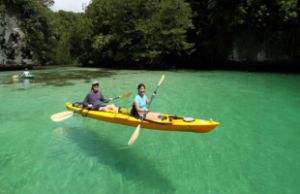 Nikko Bay is a great place for kayaking and snorkeling. A good place to launch your kayak is Ngermid Boat Pier. |
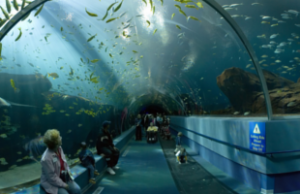 Palau Aquarium, Small aquarium with a variety of outdoor pools & indoor tanks showcasing local marine life. |
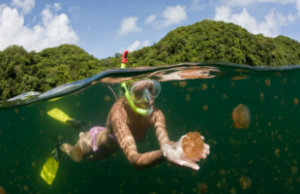 Nikko Bay is a great place for kayaking and snorkeling. A good place to launch your kayak is Ngermid Boat Pier. Head a few hundred meters south from the pier. |
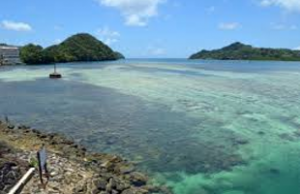 Long Island Park offers a mildly interesting snorkeling area. It's located just south of the two bridges that connect Koror and Malakal. From Koror, cross the first bridge and then turn left. |
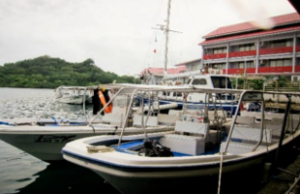 Fish 'n Fins, Dive shop Palau, Address: Koror, Palau, Phone: +680 488 2637, Open 24 hours. |
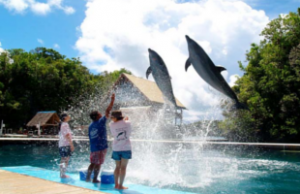 Dolphins Pacific Aquarium in Palau |
Accommodation
|
 |
||||||
 |
 |
||||||
.













